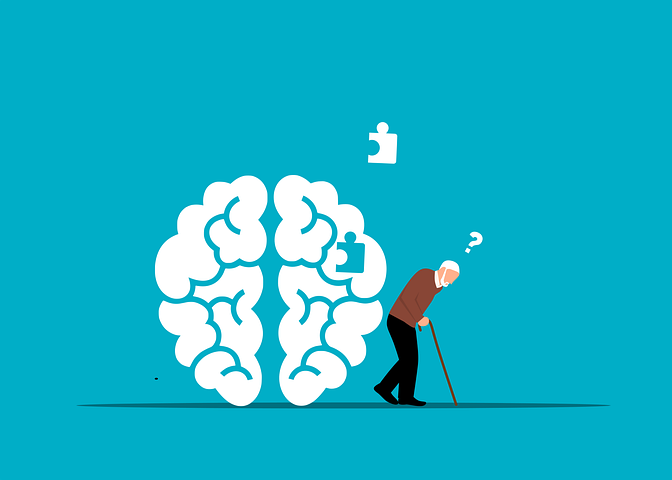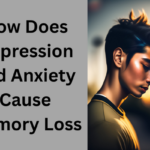Understanding and Managing Memory Loss: Causes, Prevention, and Treatment

Memory Loss Introduction
Memory loss can have a significant impact on daily life, making it difficult to remember important information and events. However, understanding the causes of memory loss, risk factors, and effective prevention and treatment methods can help you manage this condition. This comprehensive guide will provide you with the information you need to better understand and manage it.
Causes of Memory Loss
There are several different causes of memory loss, including age-related, dementia, traumatic brain injury, and other causes and risk factors.
Age-related Memory Loss
Age-related memory loss, also known as age-associated memory impairment (AAMI), is a normal part of the aging process. As we get older, it becomes more difficult to remember new information and recall information that we’ve previously learned. However, age-related loss does not necessarily lead to serious memory problems, and with age, our ability to recall long-term memories remains intact.
Age-related loss is often caused by changes in the brain that occur as we age, such as a decrease in the number of nerve cells and connections in the brain. Factors such as high blood pressure, diabetes, and high cholesterol can also contribute to age-related memory loss. While age-related memory loss is a normal part of aging, it is important to maintain a healthy lifestyle and engage in activities that promote cognitive health, such as memory exercises and a brain-healthy diet, to help slow down the progression of the condition.
Dementia
Dementia is a general term for a decline in cognitive function that interferes with daily life. Losing the memory is one of the most common symptoms of dementia. There are different types of dementia, such as Alzheimer’s disease and vascular dementia, each with its specific symptoms, causes and treatment. Alzheimer’s disease is the most common form of dementia and it is caused by the progressive degeneration of nerve cells in the brain.
Vascular dementia is caused by damage to the blood vessels that supply the brain, often as a result of a stroke. Symptoms of dementia can include memory loss, difficulty with language, disorientation, mood swings, and difficulty with basic tasks. As dementia progresses, it can lead to an increased reliance on caregivers, and eventually, a loss of independence. There is no cure for dementia, but treatments and therapies are available that can help manage symptoms and improve quality of life.
Traumatic Brain Injury
Traumatic brain injury (TBI) is a type of injury that occurs when an external force such as a blow or jolt to the head causes damage to the brain. TBI can range from mild, such as a concussion, to severe, resulting in long-term disability or even death. Memory loss is a common symptom of TBI, and can range from short-term memory loss to long-term memory loss.
The type and extent of memory loss depends on the severity of the injury and the specific part of the brain that was affected. TBI can also cause other cognitive and physical symptoms such as confusion, headache, nausea, dizziness, and difficulty with coordination.
Treatment for TBI can include both medical care and rehabilitation therapies, such as physical therapy, occupational therapy, and speech therapy. Recovery from TBI can be a long process and it can vary greatly depending on the severity of the injury.
Other Causes and Risk Factors
Other possible causes and risk factors for memory loss include chronic stress, poor sleep, depression, poor diet, and certain medications.
Prevention and Treatment
There are several ways to prevent and treat memory loss, including memory exercises and activities, memory supplements and medications, memory therapy, and a brain-healthy diet.
Memory Exercises and Activities
Memory exercises and activities are a way to boost cognitive function and improve memory. These exercises and activities can help to improve the ability to recall information, and can help to slow down the progression of memory loss. Some examples of memory exercises and activities include:
- Playing memory games and puzzles such as crosswords, Sudoku, and memory matching games.
- Practicing mindfulness and meditation, which can help to reduce stress and improve focus.
- Using mnemonic devices, such as creating mental images or rhymes to remember information.
- Regularly engaging in physical activities such as walking, swimming, and cycling, which can also improve cognitive function.
- Learning new skills, such as a new language or a musical instrument, which can help to keep the brain active and improve memory. It is important to note that these exercises and activities should be done regularly to be effective. Incorporating them as a part of daily routine is the key to see the positive results.
Memory Supplements and Medications
Memory supplements and medications can be used as a form of treatment for memory loss, however it is important to consult with a healthcare professional before taking any supplements or medications. Certain supplements, such as omega-3 fatty acids, ginkgo biloba, and huperzine A, have been shown to have some benefit in improving memory and cognitive function.
Omega-3 fatty acids, found in fish oil, can help to reduce inflammation in the brain and improve memory and cognitive function. Ginkgo biloba is a natural extract that can improve blood flow to the brain and has been shown to improve memory and cognitive function. Huperzine A is an extract from a Chinese herb that has been used to improve memory and cognitive function.
It’s important to note that there is limited scientific evidence supporting the effectiveness of these supplements and it is not known if they are safe to take over long-term. Medications such as Cholinesterase inhibitors (donepezil, rivastigmine, and galantamine) and memantine have been approved by FDA for treatment of Alzheimer’s disease and have been proven to be helpful in some cases. It is important to consult with a healthcare professional for proper diagnosis and treatment options.
Memory Therapy
Memory therapy is a form of treatment that helps people with memory loss learn strategies for coping with and improving their memory. This can include working with a therapist to develop strategies for remembering names, appointments, and other important information. One of the most well-known forms of memory therapy is called cognitive rehabilitation therapy (CRT).
CRT is a form of therapy that helps people with memory loss improve their ability to perform daily activities, such as remembering to take medication or pay bills, by teaching them strategies for remembering important information.
Other forms of memory therapy include cognitive-behavioral therapy (CBT) and reminiscence therapy. CBT helps people with memory loss to identify and change negative thought patterns that may be affecting their memory, while reminiscence therapy involves reminiscing about past events and experiences to help improve memory.
Memory therapy can be done individually or in a group setting, and it may be done in person or over the phone. Some people may benefit from a combination of memory therapy and other treatments such as medications or supplements. It is important to consult with a healthcare professional or a therapist that specializes in memory loss to determine the best course of treatment.
Brain-healthy Diet
A brain-healthy diet is an essential part of maintaining cognitive health and preventing memory loss. Eating a diet that is rich in fruits, vegetables, whole grains, and fish can help to promote brain health and improve memory and cognitive function. These foods are high in nutrients such as antioxidants, omega-3 fatty acids, and B vitamins that are essential for brain health.

Fruits and vegetables are a rich source of antioxidants, which can help to reduce inflammation in the brain and improve cognitive function. Whole grains such as oatmeal, quinoa, and brown rice are high in B vitamins, which are essential for brain function. Fish such as salmon, mackerel, and sardines are high in omega-3 fatty acids, which can help to reduce inflammation in the brain and improve cognitive function.
It is also important to limit the intake of foods high in saturated fats, trans fats, and added sugars as they can have a negative impact on brain health and cognitive function. Additionally, consuming moderate amounts of caffeine and alcohol in a healthy diet is also beneficial for cognitive function.
It is important to consult with a healthcare professional or a registered dietitian to determine the best brain-healthy diet for your specific needs and dietary restrictions.
Managing Risk Factors
Managing certain risk factors can also help prevent and treat memory loss, including stress and memory loss, sleep and memory loss, and depression and memory loss.
Stress and Memory Loss
Stress can have a negative impact on memory and cognitive function. Chronic stress can lead to an increase in the hormone cortisol, which can damage the hippocampus, the part of the brain responsible for memory and learning. This can result in difficulty remembering new information and recalling previously learned information.

Stress can also lead to poor sleep, which can further contribute to memory loss. Sleep is essential for memory consolidation, the process by which memories are strengthened and stored in the brain. When stress interferes with sleep, it can disrupt the process of memory consolidation and lead to difficulty remembering new information.
Managing stress through techniques such as mindfulness and meditation, yoga, and exercise, can help to reduce cortisol levels and improve cognitive function. Additionally, getting enough sleep and following a healthy diet can help to manage stress and improve memory and cognitive function. It is important to consult with a healthcare professional to determine the best course of action for managing stress and its impact on memory loss.
Sleep and Memory Loss
Sleep plays an important role in memory and cognitive function. During sleep, the brain consolidates memories and processes new information, making it easier to recall the information later. Adequate sleep is also essential for maintaining overall cognitive function, including attention, concentration, and problem-solving.
Lack of sleep or poor quality of sleep can have a negative impact on memory and cognitive function. Studies have shown that people who do not get enough sleep have a harder time remembering new information and recalling previously learned information. Additionally, sleep deprivation can lead to an increase in the hormone cortisol, which can damage the hippocampus, the part of the brain responsible for memory and learning.
Getting enough sleep, ideally 7-9 hours per night, is essential for maintaining memory and cognitive function. Additionally, following good sleep hygiene practices, such as keeping a regular sleep schedule, avoiding caffeine and electronics before bedtime, and creating a comfortable sleep environment, can help to improve the quality of sleep. It is important to consult with a healthcare professional if you are experiencing difficulty sleeping or if you suspect that your sleep is impacting your memory and cognitive function.
Depression and Memory Loss
Depression can have a negative impact on memory and cognitive function. Studies have shown that people with depression have a harder time remembering new information and recalling previously learned information. Additionally, depression can lead to poor sleep, which can further contribute to memory loss. Sleep is essential for memory consolidation, the process by which memories are strengthened and stored in the brain. When depression interferes with sleep, it can disrupt the process of memory consolidation and lead to difficulty remembering new information.
Depression can also cause changes in the brain that can impact memory and cognitive function. Research suggests that people with depression have changes in the hippocampus, the part of the brain responsible for memory and learning. Additionally, depression can lead to a decrease in the number of nerve cells and connections in the brain.
Treating depression can help to improve memory and cognitive function. Antidepressant medications, talk therapy, and other forms of psychotherapy can help to alleviate symptoms of depression and improve overall cognitive function. It is important to consult with a healthcare professional if you are experiencing symptoms of depression, such as a loss of interest in activities, feelings of hopelessness, or changes in appetite or sleep, as early diagnosis and treatment can prevent the negative impact on memory and cognitive function.
Memory Loss Conclusion
Memory loss can have a significant impact on daily life, but understanding the causes, risk factors, and effective prevention and treatment methods can help you manage this condition. Incorporating memory exercises and activities, taking memory supplements and medications under the supervision of a healthcare professional, trying memory therapy, and following a brain-healthy diet can help improve memory and cognitive function.
Additionally, managing stress, getting enough sleep, and treating depression can also help prevent and treat memory loss. Remember to seek out professional help if you are struggling with memory loss or any of the risk factors mentioned above.
This article is just an overview of the topic, and there are many more aspects to consider. For more information and support on memory loss, visit the websites of organizations such as the Alzheimer’s Association, the National Institute on Aging, and the Traumatic Brain Injury Model Systems.
Frequently Asked Questions
Q. What are the common causes of memory loss?
A. Common causes of memory loss include age-related, dementia, traumatic brain injury, chronic stress, poor sleep, depression, poor diet, and certain medications.
Q. What are some effective prevention and treatment methods for memory loss?
A. Effective prevention and treatment methods for memory loss include memory exercises and activities, memory supplements and medications under the supervision of a healthcare professional, memory therapy, and a brain-healthy diet. Additionally, managing stress, getting enough sleep, and treating depression can also help prevent and treat memory loss.
Q. Is there any way to reverse memory loss or will it always be irreversible?
A. The severity and progression of memory loss varies depending on the cause. In some cases, ity loss may be reversible with the right treatment or management of underlying causes or risk factors. However, in other cases, memory loss may be irreversible. It is important to consult with a healthcare professional to determine the best course of action for your specific situation.




